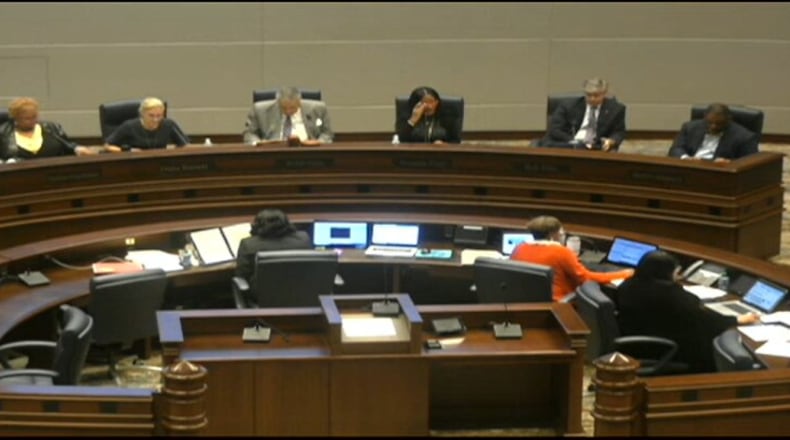Fulton County commissioners want to take a deeper dive into the possibility of health care redlining throughout the county, with one calling to extend possible investigations against Wellstar to include other health systems such as Emory.
A new report presented Wednesday during a Fulton County Board of Commissioners meeting reinforced the need for health care services in south Fulton. The report linked the lack of care options to a five year reduced life expectancy compared to north Fulton.
The report, produced by with Morehouse School of Medicine and consulting firm Ernst and Young over a span of eight weeks, details what is being described as a public health emergency in south Fulton. Residents of south Fulton County have the lowest access to health care out of all of the county’s residents and lack health care facilities and providers for primary and specialty care needs.
“I don’t just want to investigative Wellstar, I want [federal officials] to investigate redlining, health care in Fulton County period. I don’t care who it is,” Marvin Arrington Jr., Fulton County Commissioner for District 5, which includes parts of south Fulton. “If there is redlining, it needs to be addressed.”
Several commissioners said that the report provided data to support what they already knew. Along with data, solutions were provided by Morehouse School of Medicine and Ernst and Young to address needs and gaps worsened by the closure of Atlanta Medical Center downtown and Atlanta Medical Center South in East Point.
In 2022, Wellstar permanently closed AMC and AMC South. According to Wellstar, both locations a were losing money. Both hospitals served a patient population that included many low-income residents of color without insurance.
The goal is for initiatives to be launched with five solutions in mind: limiting financial barriers when accessing care, removing cultural barriers in the health care system, using technology to enhance care delivery, redesigning how care is delivered and ensuring that residents have the facilities, services and providers that they need within a reasonable traveling distance.
“As a result of the Wellstar closure, an already pressured system has felt even more pressure,” said Dr. Joseph Tyndall, dean of Morehouse School of Medicine. “We have to actually pull together the strategy to ensure that we build on each of these solutions to impact what comes next.”
Addressing the social determinants of health, social and economic factors that influence health such as housing, income and education level were also highlighted as ways to eliminate health disparities.
According to the report, south Fulton has zero cardiology, pulmonology and infectious disease specialists, doctors that care for patients with heart disease, respiratory diseases and HIV and AIDS, all of which are conditions that heavily affect the people living in the area. Additionally, the region has two oncology and six neonatal specialists, both are types of providers needed by the community of 234,000 residents.
In Atlanta, wait times at the city’s remaining hospitals are higher than national and state standards and facilities are overcrowded, according to the report.
“I am very passionate about my community because somebody has to be,” said Khadijah Abdur-Rahman, Fulton County Commissioner for District 6, which includes much of south Fulton. “We do not have the heath care that we need.”
Fulton County and Morehouse School of Medicine have partnered to ensure that Grady Memorial Hospital is financially secure, to use current providers in new ways to meet needs, to create partnerships for a new care network and to close the coverage gap.
Following the board of commissioners meeting, Morehouse of School of Medicine chief executive officer and president, Dr. Valerie Montgomery Rice met with the board for a closed session to discuss further steps based upon the information provided in the report.
Overall, the Morehouse School of Medicine Dean Tyndall said that they are still working with the county to explore next steps.
“We’re still really in the drawing phases of this,” said Tyndall. “One thing we know is that we’re going to have to act quickly. That’s what we’re focused on.”
The Atlanta Journal-Constitution and Report for America are partnering to add more journalists to cover topics important to our community. Please help us fund this important work at ajc.com/give
About the Author
Keep Reading
The Latest
Featured



